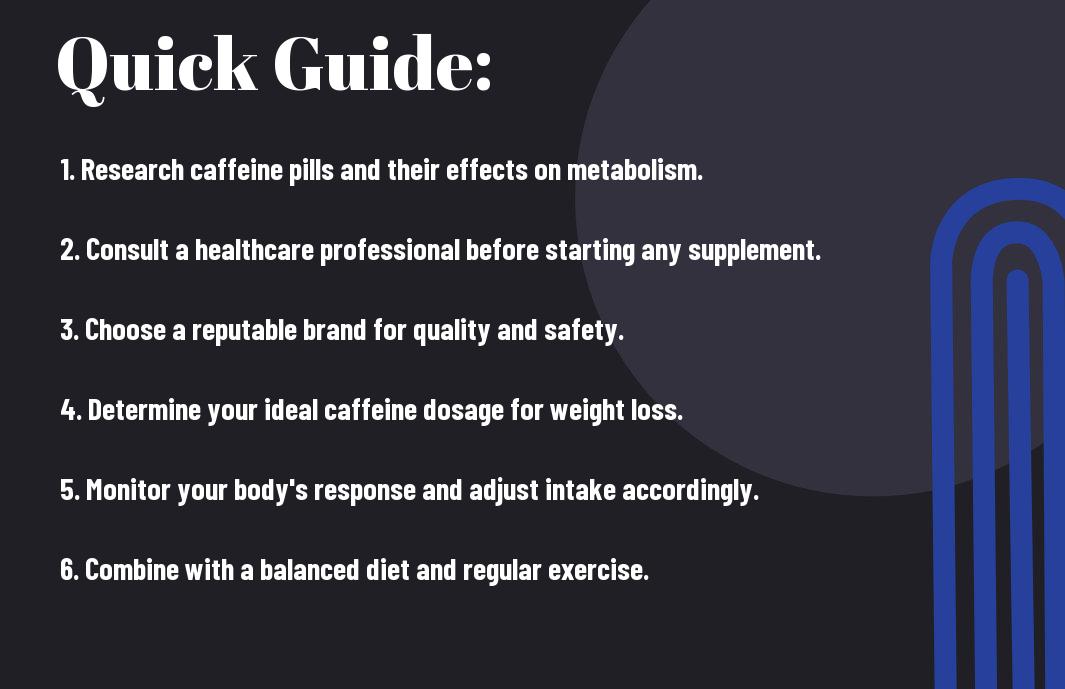You may be curious about the role of caffeine pills in weight loss and how they can fit into your fitness journey. This guide will help you explore the benefits and potential risks associated with caffeine supplementation, offering practical insights to enhance your understanding. From dosage recommendations to expected outcomes, you will gain the knowledge needed to make informed decisions about incorporating caffeine pills into your routine for effective weight management.

Key Takeaways:
- Caffeine pills can aid in weight loss by boosting metabolism and increasing fat oxidation.
- They may enhance exercise performance, allowing users to work out harder and longer.
- It’s important to start with a low dose to assess tolerance and minimize potential side effects such as jitters or insomnia.
- Caffeine has a diuretic effect, which may lead to temporary weight loss through water loss, but this isn’t fat loss.
- Combining caffeine pills with a balanced diet and regular exercise can optimize their weight loss benefits.
- Users should be aware of their total daily caffeine intake from all sources to avoid excessive consumption.
- Consulting with a healthcare provider before starting any new supplement regimen is recommended, especially for those with pre-existing health conditions.
Types of Caffeine Pills
Before you decide on a caffeine pill for weight loss, it’s necessary to understand the various types available. Here’s a breakdown of the key options:
- Standard Caffeine Pills
- Extended-Release Caffeine Pills
- Energy Blends
- Combination Supplements
- Prescription Caffeine Pills
Assume that knowing these types can help you make an informed decision tailored to your specific weight-loss goals.
| Type | Description |
|---|---|
| Standard Caffeine Pills | Offer a regular dose of caffeine. |
| Extended-Release Caffeine Pills | Gradually release caffeine into your system over time. |
| Energy Blends | Mix caffeine with other stimulants or vitamins. |
| Combination Supplements | Include caffeine with fat burners or other ingredients. |
| Prescription Caffeine Pills | Prescribed for specific health concerns. |
Stimulant Variants
One important aspect of caffeine pills is that they often include various stimulant variants. These can enhance the effects of caffeine and contribute to increased alertness and energy. Some common stimulant variants include ephedrine and synephrine. Being aware of these additives can help you gauge how the pill may affect your performance.
Natural vs. Synthetic Options
Assuming you are examining natural versus synthetic options, it’s important to understand their differences. Each type may affect your body in varying ways, influencing your choice based on personal preferences and dietary needs.
Types of natural options include caffeine sourced from coffee beans, tea leaves, and yerba mate, while synthetic options are usually chemically produced. Natural caffeine might provide additional health benefits due to antioxidants present, while synthetic caffeine can offer a more controlled dose. You should consider your personal health goals and any sensitivities when choosing between these two types.


Tips for Effective Use
The effective use of caffeine pills for weight loss can enhance your results. To maximize their benefits, consider the following tips:
- Start with a low dosage to assess tolerance.
- Stay hydrated by drinking plenty of water.
- Avoid combining with other stimulants.
- Integrate a balanced diet and exercise routine.
- Consult a healthcare professional for personalized advice.
Recognizing how to use caffeine pills properly can significantly impact your weight loss journey. For more information, check out the ECA Stack: Safety, Results, and More.
Dosage Recommendations
Recommendations for caffeine pill dosing typically suggest starting with 100-200 mg daily, adjusting as needed based on your body’s response. It’s important to follow manufacturer guidelines and not exceed 400 mg per day, which is considered a safe upper limit for most adults. Monitor your body’s reactions closely and make adjustments accordingly.
Timing Your Intake
The timing of your caffeine pill intake can significantly influence your energy levels and effectiveness in promoting weight loss. Taking your pill around 30-60 minutes before workouts can provide an energy boost, enhancing your performance. Additionally, spacing your doses throughout the day can maintain your energy levels without causing jitters.
Understanding how your body responds to caffeine over time will help you find the best schedule for taking caffeine pills. Adjusting the timing based on your daily activities and workout regimes can optimize your results, keeping you energized and focused throughout the day.
Step-by-Step Guide for Beginners
All you need to kickstart your journey with caffeine pills is a comprehensive understanding of how to properly utilize them for weight loss. Start by familiarizing yourself with Caffeine Pills: What to Know. Here’s a quick breakdown of imperative steps:
| Step | Action |
| 1 | Research reputable brands |
| 2 | Understand recommended dosages |
| 3 | Plan your schedule for consumption |
Choosing the Right Product
With a variety of caffeine pills available, it’s important to select one that aligns with your needs. Look for products that list their ingredients clearly and have positive user reviews. Prioritize brands that are transparent about the source of their caffeine and that avoid excessive additives.
Incorporating Pills into Your Routine
An effective way to integrate caffeine pills into your lifestyle is by aligning them with your daily schedule. Taking your dose about 30 minutes before your workout can enhance energy and motivation.
Right timing can amplify the benefits you receive from caffeine pills. Additionally, consider the impact on your sleep by avoiding consumption too close to bedtime. Experimenting with different times during the day can help you find what works best, ensuring you harness the energy boost while minimizing side effects.

Factors to Consider
For effective weight loss with caffeine pills, there are several factors you should consider before starting. These include:
- Your overall health status
- Dosage and timing of caffeine intake
- Your tolerance to caffeine
- Individual goals and body response
Any of these factors can impact the effectiveness and safety of caffeine pills in your weight loss journey.
Personal Health Conditions
There’s a need to evaluate your personal health conditions before taking caffeine pills. If you have a history of heart problems, anxiety disorders, or high blood pressure, it’s important to consult with a healthcare professional. Caffeine can have stimulant effects that may exacerbate underlying conditions or lead to unwanted side effects.
Lifestyle and Activity Level
Level of activity and lifestyle can significantly influence how caffeine pills affect you during your weight loss efforts. A highly active lifestyle may require more caffeine to enhance performance, while a sedentary routine might necessitate less reliance on stimulants.
It’s important to assess how your daily habits align with your weight loss plan. Engaging in regular exercise combined with moderate caffeine use can boost your metabolism and energy levels. Conversely, if you lead a more inactive lifestyle, even small doses of caffeine can cause jitters or energy crashes. Being attuned to your body’s reaction will help you optimize the benefits of caffeine pills in your weight loss journey.
Pros and Cons of Caffeine Pills
After exploring caffeine pills, you should weigh the advantages and disadvantages to determine if they align with your health goals. Here’s a detailed breakdown of the pros and cons:
| Pros | Cons |
|---|---|
| Boosts metabolism | May cause insomnia |
| Increases energy levels | Risk of dependency |
| Improves focus | Possible jitters or anxiety |
| Convenient and portable | May cause digestive issues |
| Affordable option | Can lead to heart palpitations |
Benefits for Weight Loss
The caffeine in these pills can enhance your weight loss efforts by increasing your metabolic rate and promoting fat oxidation. This means you may burn more calories, even at rest, making it easier to shed those extra pounds. Additionally, caffeine may help curb your appetite, allowing you to manage your food intake more effectively.
Potential Risks and Side Effects
Weight loss through caffeine pills is not without its dangers; you must consider the potential adverse effects. While caffeine can aid in boosting metabolism, it may also lead to unwanted side effects that impact your overall health.
Benefits of taking caffeine pills can be quickly overshadowed by possible side effects if taken excessively. These may include anxiety, heart palpitations, digestive issues, and sleep disturbances. It’s crucial to monitor your body’s response and consult with a healthcare professional to ensure safe usage, particularly if you’re sensitive to caffeine. Balance is key to maximizing the benefits while mitigating risks.
Best Practices for Monitoring Progress
Keep a close eye on your progress as you incorporate caffeine pills into your weight loss regimen. Regularly evaluate your weight, energy levels, and overall wellness to ensure that you are on the right path. Consistency is key; maintaining a journal can help you track changes over time, making it easier to identify what works for you and what doesn’t.
Tracking Results
With the right tools and methods, tracking your results can provide valuable insights into your weight loss journey. Utilize apps or simple spreadsheets to record your daily caffeine intake and any changes in your weight or performance. This data will help you discern patterns and understand how caffeine pills impact your body, allowing for more informed decisions.
Adjusting Your Approach
Practices that aren’t yielding results may need reevaluation. As you analyze your progress, consider adjusting factors such as caffeine dosage, exercise routines, or dietary habits to optimize your outcomes. Staying flexible allows you to find the most effective combination for your individual needs, ensuring you’re continuously moving toward your weight loss goals.
Your body responds uniquely to caffeine, so adjustments should be based on your specific experiences. If you find that you’re not losing weight or feel jittery, you might lower your caffeine intake or alter the timing of when you take your pills. Continually assessing and fine-tuning your approach will help maximize the effectiveness of your weight loss efforts, making the journey more successful and sustainable.
Final Words
With this in mind, understanding caffeine pills as a tool for weight loss can empower your fitness journey. By knowing how these supplements work, their potential benefits, and the importance of proper dosage, you can make informed decisions that align with your goals. Always consult with a healthcare professional before integrating caffeine pills into your routine to ensure they support your overall health. Educating yourself is a key step towards achieving your weight loss objectives while minimizing risks.
FAQ
Q: What are caffeine pills, and how do they work for weight loss?
A: Caffeine pills are dietary supplements that contain concentrated doses of caffeine, which is a natural stimulant found in coffee, tea, and various energy drinks. They work for weight loss primarily by increasing metabolic rate, enhancing fat oxidation, and potentially suppressing appetite. When taken as part of a balanced diet and exercise routine, caffeine pills may help in losing weight more effectively.
Q: How much caffeine is typically found in a caffeine pill?
A: The amount of caffeine in a caffeine pill can vary widely depending on the brand and formulation. Most commonly, caffeine pills contain between 100mg to 200mg of caffeine. It is crucial to check the label for specific dosage information and consider your personal caffeine tolerance before consumption.
Q: Are caffeine pills safe for everyone?
A: While caffeine pills are safe for many people when taken within recommended dosages, they may not be suitable for everyone. Individuals who are sensitive to caffeine, pregnant or breastfeeding, or those with certain medical conditions, such as heart disorders or anxiety disorders, should consult a healthcare provider before using caffeine pills for weight loss.
Q: How should I take caffeine pills for the best results?
A: For optimal results, it is advisable to take caffeine pills as directed by the manufacturer. Many suggest taking them about 30 to 60 minutes before workouts to enhance performance and fat burning. It’s important to stay hydrated and not to exceed the recommended daily intake to avoid adverse effects like jitteriness or insomnia.
Q: Can caffeine pills replace a healthy diet and exercise routine?
A: No, caffeine pills cannot replace a healthy diet and exercise routine. They should be viewed as a supplement to a well-rounded weight loss plan. Sustainable weight management requires a combination of healthy eating, regular physical activity, and other lifestyle factors. Caffeine pills may aid in this process but are not a standalone solution.
Q: Are there any potential side effects of taking caffeine pills?
A: Potential side effects of caffeine pills can include jitteriness, increased heart rate, insomnia, headaches, and gastrointestinal issues when taken in high doses. It is important to start with a lower dose to assess tolerance and discuss any concerns with a healthcare professional if side effects persist.
Q: How can I assess my tolerance to caffeine pills?
A: To assess your tolerance to caffeine pills, it’s advisable to start with the lowest possible dose and monitor your body’s response. Factors to consider include energy levels, sleep quality, and overall well-being. If you experience negative side effects, consider reducing the dosage or discontinuing use and consulting a healthcare provider as needed.





